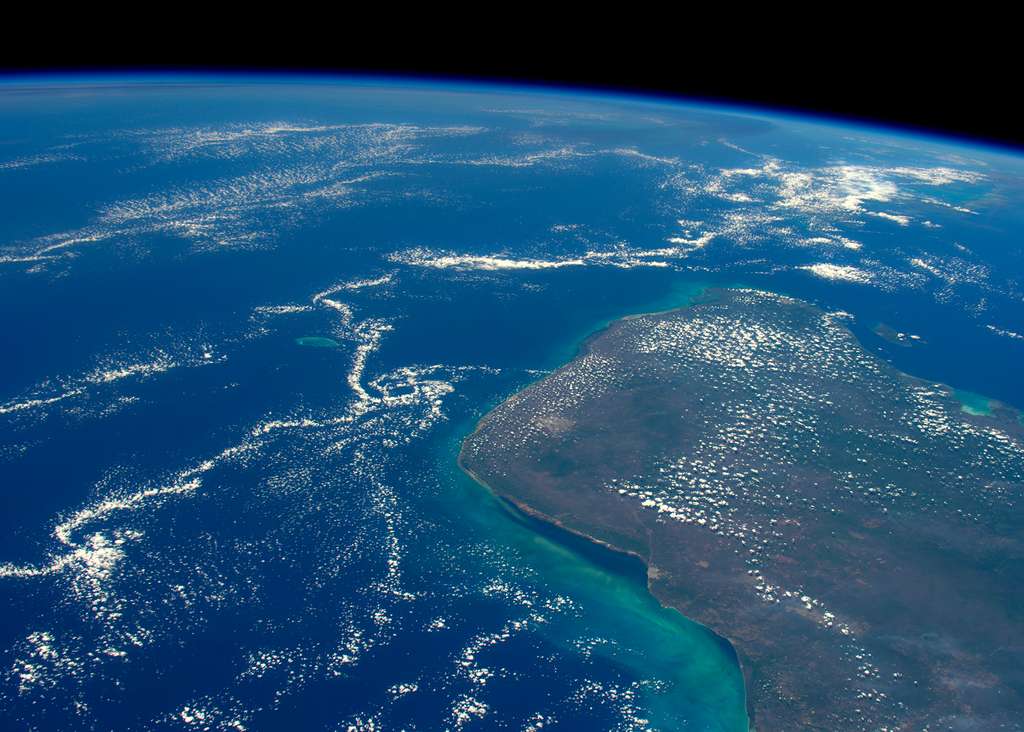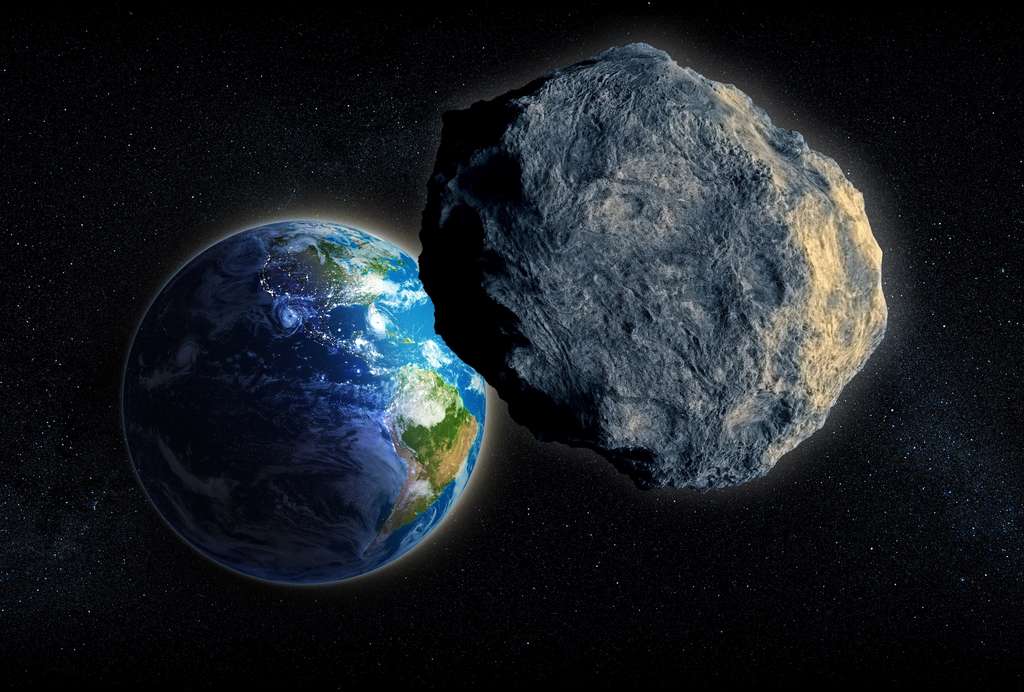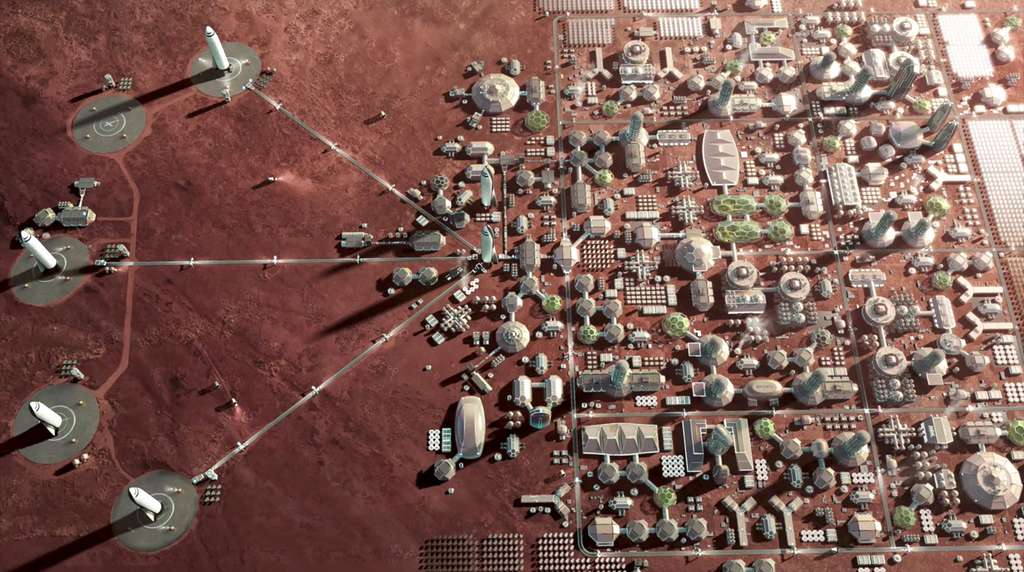Jean-Marc Salotti: “Humanity’s Greatest Risk Of Extinction Is Associated With Comets”

Explore the interviews of researchers, photographers, travelers who witnessed a world that is changing under the yoke of global warming.
As announced in our previous article “ The extinction of humanity by the impact of a giant asteroid is a realistic hypothesis », Jean-Marc Salotti tells us about the future of Humanity in the event of a collision of the Earth with giant asteroids or comets long term.
Futura: is this study on the risk of collision with giant asteroids or giant long-period comets unprecedented?
Contents [hide]
Futura: is this study on the risk of collision with giant asteroids or giant long-period comets unprecedented?
Futura: How reliable is your risk estimate?
Futura: You have come to the conclusion that it seems difficult and uncertain to divert a giant asteroid from its collision course. Is the human species doomed to extinction following an impact with a giant celestial body?
Futura: With the fall of an object ten times larger than the asteroid that caused the Cretaceous extinction, will the consequences be even more catastrophic?
Futura: Would it be the end of life on Earth?
Futura: You talk about catastrophic changes in the global ecosystem. Concretely, what to expect?
Futura: In your opinion, the greatest risk for the human species would come from long-period comets rather than giant asteroids? It is very surprising. The asteroids are however more numerous!
Futura: With a giant comet, are the chances of survival of the human species rather low, even nil?
Futura: You seem pretty confident that “many thousands” of people could be sent to Mars and given enough time to prepare for Earth’s demise.

Futura: Why Mars rather than the Moon, or even colonize an asteroid?
Futura: As interesting as this study is, I doubt that space agencies will initiate precursor colonization programs on other planets, except to think that these could find a use on Earth or meet specific needs of current exploration programs. .
Futura: What is your view on Elon Musk, who we know founded SpaceX to establish a Mars colony to preserve humanity, which would initially depend on the Earth to “survive”, then over the years would become autonomous .
Share this:
Jean-Marc Salotti: To my knowledge yes. I had already worked 15 years ago on the risks of collision with a asteroid, but not specifically about giant asteroids. I searched the literature for an answer to the probability of a giant asteroid impact and couldn’t find it. So I dug into the question by reading dozens of articles, in particular on the formation of the Solar systemon the origin of lunar craterson the different categories of giant asteroids, on the number of giant comets present in the oort cloud, etc. and I also talked a lot with Sean Raymond who guided my research. This study, Humanity extinction by asteroid impacttook me almost two years.

La presqu’île du Yucatan, au Mexique, abrite le lieu de l’impact qui a mis fin à
l’existence des dinosaures il y a 65 millions d’années.  ESA, Nasa
ESA, Nasa
?Futura: How reliable is your risk estimate
Jean-Marc Salotti: Apart from possible uncertainties and biases that could lead to an underestimation of risk, there could be other biases that could completely alter the probabilities. For example, unexpectedly, the Solar system could enter a galactic area with a high density of small bodies and the threat could suddenly be increased by several orders of magnitude. The distributions of frequency current size of interstellar objects suggest that the threat posed by such objects is very low, but since the models are based on very limited data, the best answer to the risk assessment is that we know almost nothing about it.
Futura: You have come to the conclusion that it seems difficult and uncertain to divert a giant asteroid from its collision course. Is the human species doomed to extinction following an impact with a giant celestial body?
Jean-Marc Salotti: No. I think, and everything will depend on the warning period, that thespecies human could survive by settling on Mars for example. If the delay is long enough (at least a century) and if survival on Earth is compromised, the solution is indeed to settle on another planet and achieve a autonomy total before impact. Obviously, this option will only affect a small number of individuals, and for the others, it will be necessary to try to survive in shelters on Earth.
Futura: With the fall of an object ten times larger than the asteroid that caused the Cretaceous extinction, will the consequences be even more catastrophic?
Jean-Marc Salotti: It is beyond measure. Catastrophic changes are expected in theecosystem global. If theextinction of the Cetacean caused the disappearance of about 75% of all life forms, an object 100 kilometers away would doom practically all living organisms!
Futura: Would it be the end of life on Earth?
Jean-Marc Salotti: All the forms of life at the surface and under the ocean would be killed, with the possible exception of extremophiles in deep hydrothermal vents, if not killed by the heat or acidification of their environment, and bacteria deeply buried in the Earth’s crust.
Futura: You talk about catastrophic changes in the global ecosystem. Concretely, what to expect?
Jean-Marc Salotti: To describe the events that would occur, I relied on several studies, including the model of Collins, Melosh and Marcus (2005). The first effect would be a huge crater, possibly over 1,100 kilometers in diameter. In less than a minute, a fireball would radiate and burn almost everything up to 4,800 kilometers around the point of impact. The blast from the explosion would cause massive destruction. During this time, huge amounts of ejections would be thrown into theatmosphere before falling all over the world, destroying forests, cities, causing tsunamis and earthquake.
According to one study, with such high energy impacts, a surprising consequence would be the melting of the earth’s crust located exactly at the antipodes of the impact. While all life would be killed within seconds up to a few thousand miles around the impact site, some life forms on the other side of the Earth would survive the immediate effects. However, the environment would quickly become unlivable with a global temperature increase of up to several hundred degrees Celsius due to several factors including fireballs falling to Earth, fires, outbreaks of volcanoes all over the world and a terrible greenhouse effect due to the long-lasting accumulation of dust throughout the atmosphere. In addition, the temperature exceeding 100°C, the oceans would start to boil and a layer of burning water vapor of around 100 bars would envelop the planet.
Futura: In your opinion, the greatest risk for the human species would come from long-period comets rather than giant asteroids? It is very surprising. The asteroids are however more numerous!
Jean-Marc Salotti: It’s not contradictory. This study shows that the greatest risk of long-term impact comes from NEOs (Near-Earth Objects), which are already in the inner Solar System or will enter this area in the future (for example, the Centaurs). But the warning time would be long enough to allow time for humans to settle on another planet. The risk of extinction would thus be much lower than the probability of impact. The greatest risk of extinction is therefore associated with comets. That said, for the next 100 years, the probability of impact is low, on the order of 10-12but the warning period is so short that it is doubtful that any action can mitigate the consequences.
Futura: With a giant comet, are the chances of survival of the human species rather low, even nil?
Jean-Marc Salotti: We must face the facts. With such a short warning period, we cannot go to Mars and we have very little time to prepare. For humans to survive such a catastrophe on Earth, they will have to live in shelters, whether underground or aquatic, for several decades. However, and I explain it in my study, survival in these shelters is absolutely not guaranteed for a whole host of reasons, sometimes linked to a vital resource such as energy, water or food, sometimes industrial or logistics if we are unable to maintain or replace a faulty system, or for human reasons, for example if the organization is unsuitable or if humans end up killing each other.

Dévier un astéroïde géant qui menacerait la Terre semble difficile et incertain.  Mopic, Adobe Stock
Mopic, Adobe Stock
Futura: You seem pretty confident that “many thousands” of people could be sent to Mars and given enough time to prepare for Earth’s demise.
Jean-Marc Salotti: I don’t deny the problems but I think that although there is no guarantee that the installation will go well, the main problems that these future settlers would face would occur before impact. Solutions could therefore be found and implemented also before the impact. The longer the warning time, the more time there will be available for humans to adapt to Martian conditions and prepare to live in complete autonomy. I think there is therefore a good chance that such a project will succeed.
Futura: Why Mars rather than the Moon, or even colonize an
?asteroid
Jean-Marc Salotti: The Moon is also an interesting destination and some would probably try to settle there. However, Mars has the advantage of being a planet close to Earth with a greater variety of resources useful to a colony. The idea is to exploit solar energy, water ice, abundant in the Martian subsoil, the carbon dioxide of the atmosphere, of minerals such as hematite to obtain iron for example, etc. and rely on theAgriculture in greenhouses and an industrial infrastructure that would make it possible to produce the tools and objects necessary for survival.
Futura: As interesting as this study is, I doubt that space agencies will initiate precursor colonization programs on other planets, except to think that these could find a use on Earth or meet specific needs of current exploration programs. .
Jean-Marc Salotti: Indeed, you are right. Starting colonization right away is too early. We must first go back and forth to better understand the issues of survival in the martian environment, identify the difficulties, and master the journey. However, if no effort is made to settle on other planets, the likelihood of extinction increases over time. For example, without alien colonization and just for the threat posed by giant comets, for the next million years the probability of extinction is greater than 10-8which is high considering the possible consequences.

Concept de ville martienne envisagé par SpaceX.  SpaceX
SpaceX
 SpaceX
SpaceXFutura: What is your view on Elon Musk, who we know founded SpaceX to establish a Mars colony to preserve humanity, which would initially depend on the Earth to “survive”, then over the years would become autonomous .
Jean-Marc Salotti: I’m probably on the same wave length than him. This is also one of the reasons why I carried out this study. I wanted to know how important it was to colonize Mars to reduce the risk of human extinction. That said, it’s not just the risk associated with celestial objects, the international political crisis also raises fears of the worst. And there are other misunderstood global risks, such as that of a artificial intelligence which would eventually destroy humanity.
https://www.shkmgmcnuh.org/jean-marc-salotti-humanitys-greatest-risk-of-extinction-is-associated-with-comets/3192662022/

